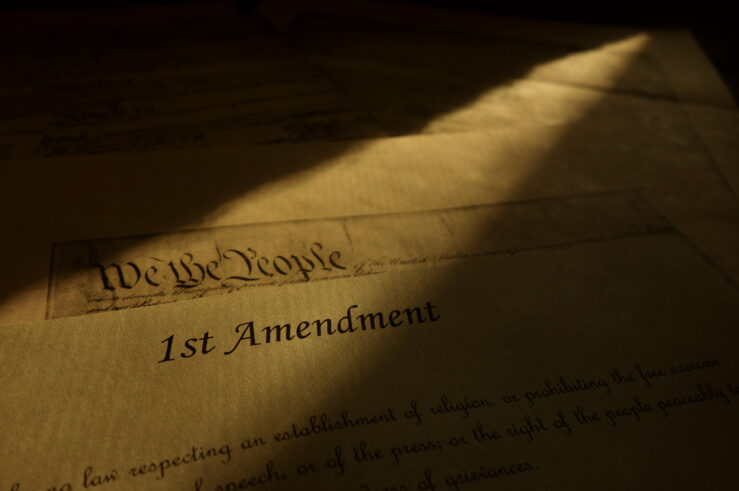Showing archive for: “Intermediary Liability”
A Coasean Analysis of Offensive Speech
Words can wound. They can humiliate, anger, insult. University students—or, at least, a vociferous minority of them—are keen to prevent this injury by suppressing offensive speech. To ensure campuses are safe places, they militate for the cancellation of talks by speakers with opinions they find offensive, often successfully. And they campaign to get offensive professors ... A Coasean Analysis of Offensive Speech
How Changing Section 230 Could Disrupt Insurance Markets
In recent years, a diverse cross-section of advocates and politicians have leveled criticisms at Section 230 of the Communications Decency Act and its grant of legal immunity to interactive computer services. Proposed legislative changes to the law have been put forward by both Republicans and Democrats. It remains unclear whether Congress (or the courts) will ... How Changing Section 230 Could Disrupt Insurance Markets
An L&E Defense of the First Amendment’s Protection of Private Ordering
In his recent concurrence in Biden v. Knight, Justice Clarence Thomas sketched a roadmap for how to regulate social-media platforms. The animating factor for Thomas, much like for other conservatives, appears to be a sense that Big Tech has exhibited anti-conservative bias in its moderation decisions, most prominently by excluding former President Donald Trump from ... An L&E Defense of the First Amendment’s Protection of Private Ordering
Committee Prepares to Grill Tech CEOS, but It Is the First Amendment That Could Get Torched
In what has become regularly scheduled programming on Capitol Hill, Facebook CEO Mark Zuckerberg, Twitter CEO Jack Dorsey, and Google CEO Sundar Pichai will be subject to yet another round of congressional grilling—this time, about the platforms’ content-moderation policies—during a March 25 joint hearing of two subcommittees of the House Energy and Commerce Committee. The ... Committee Prepares to Grill Tech CEOS, but It Is the First Amendment That Could Get Torched
The Dishonesty of Conservative Attacks on Section 230
President Donald Trump has repeatedly called for repeal of Section 230. But while Trump and fellow conservatives decry Big Tech companies for their alleged anti-conservative bias, including at yet more recent hearings, their issue is not actually with Section 230. It’s with the First Amendment. Conservatives can’t actually do anything directly about how social media ... The Dishonesty of Conservative Attacks on Section 230
Conservatism and the Section 230 Debate: Applying First Principles
Over at the Federalist Society’s blog, there has been an ongoing debate about what to do about Section 230. While there has long-been variety in what we call conservatism in the United States, the most prominent strains have agreed on at least the following: Constitutionally limited government, free markets, and prudence in policy-making. You would ... Conservatism and the Section 230 Debate: Applying First Principles
How does antitrust measure nonprice effects like political bias?
In the latest congressional hearing, purportedly analyzing Google’s “stacking the deck” in the online advertising marketplace, much of the opening statement and questioning by Senator Mike Lee and later questioning by Senator Josh Hawley focused on an episode of alleged anti-conservative bias by Google in threatening to demonetize The Federalist, a conservative publisher, unless they ... How does antitrust measure nonprice effects like political bias?
Senator Hawley’s Unconstitutional, Unconservative Attack on the Internet
Twitter’s decision to begin fact-checking the President’s tweets caused a long-simmering distrust between conservatives and online platforms to boil over late last month. This has led some conservatives to ask whether Section 230, the ‘safe harbour’ law that protects online platforms from certain liability stemming from content posted on their websites by users, is allowing ... Senator Hawley’s Unconstitutional, Unconservative Attack on the Internet
The Earn IT Act and the Institutional Limits of Congress
As the initial shock of the COVID quarantine wanes, the Techlash waxes again bringing with it a raft of renewed legislative proposals to take on Big Tech. Prominent among these is the EARN IT Act (the Act), a bipartisan proposal to create a new national commission responsible for proposing best practices designed to mitigate the ... The Earn IT Act and the Institutional Limits of Congress
ICLE Files COPPA Review Comments Arguing the FTC Should Repeal the 2013 Amendments
Today, I filed a regulatory comment in the FTC’s COPPA Rule Review on behalf of the International Center for Law & Economics. Building on prior work, I argue the FTC’s 2013 amendments to the COPPA Rule should be repealed. The amendments ignored the purpose of COPPA by focusing on protecting children from online targeted advertising ... ICLE Files COPPA Review Comments Arguing the FTC Should Repeal the 2013 Amendments
What’s the Harm of Targeted Ads on Children’s Content Anyway?
The FTC’s recent YouTube settlement and $170 million fine related to charges that YouTube violated the Children’s Online Privacy Protection Act (COPPA) has the issue of targeted advertising back in the news. With an upcoming FTC workshop and COPPA Rule Review looming, it’s worth looking at this case in more detail and reconsidering COPPA’s 2013 ... What’s the Harm of Targeted Ads on Children’s Content Anyway?
The Third Circuit’s Oberdorf v. Amazon opinion offers a good approach to reining in the worst abuses of Section 230
[Note: A group of 50 academics and 27 organizations, including both myself and ICLE, recently released a statement of principles for lawmakers to consider in discussions of Section 230.] In a remarkable ruling issued earlier this month, the Third Circuit Court of Appeals held in Oberdorf v. Amazon that, under Pennsylvania products liability law, Amazon ... The Third Circuit’s Oberdorf v. Amazon opinion offers a good approach to reining in the worst abuses of Section 230








